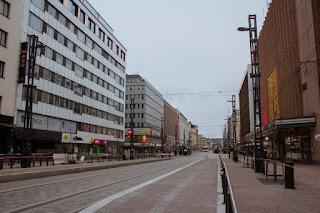Finland, The world’s best Education System
Introduction
Finland has been consistently ranked first in the field of education. Every three years research survey conducted by organization for economic cooperation and development (OECD), Evaluate education system through PISA in which educational domains such as mathematics, science and reading among students also educational policies are taken into account to measure skills like problem solving, cognition. It provides comparable data with a view to enhance educational policies across the world.
Education system in Finland makes its policy unique in the world. During childhood education they are paying a very close attention in developing social and interactive skills, enhancing a positive attitude toward learning, motivating children to care for themselves. In order to provide child physical activities, eating and cleaning practice are encouraged and prepare them mentally by allowing socialization. It assists them to develop effective communication and respect for others.
Special features
They are given equal respect and chance to develop as an individual person which gives them individuality and makes them feel confidence in a different context. Neurological research has shown that 90% of brain growth occurs during the period of the first five years, in these budding periods only freedom and playing are paramount for natural growth, forcing learning during this period will affect the mental and physical growth of children. In Finland this scientific concept has clearly understood and allows children to learn naturally like observe natural events, get them into the natural tendency of playing and are given priorities. Since children learn best through playing, the play way activities are given much importance. They foster children to care about themselves and others, make responsible decisions, develop children as productive in their society, learn to learn which pave the way for becoming a lifelong learner and make them ready to learn at the age of seven.
The main motto of Finland's educational system focuses on practical approach, innovative thinking, emphasize equality in education, and natural way of learning.
What makes Finland's education system unique?
1. Timing and educational system
Instructional hours, four hours per day and 20 hours per week, 15 minutes gap in between hours and 75 minutes of lunch break. These 15 minutes allow students to relax, think over just taught subjects and make them ready to learn for next hour. They start schooling at the age of seven only and preschool education is not mandatory, there is one common test at the end of age 16. After that students have to go through postsecondary education that is he or she has to choose either of course upper secondary or vocational course and then they can pursue under and postgraduate which take approximately three years respectively, totally nine years of educational period one has to spend after the age of 16 to complete the master degree.
2. There is no standardized tests.
As there is no test, there is no evaluation process in each grade. Assessment process made on submission of group assignment and group project with very limited home work that even should not be exceeded more than 30 minutes to finish up. This approach changes the way pupils learn and psychologically keep them away from mental stress. No fail or pass system is followed, promotion is given throughout the school education without any retention policy.
3. There is cooperative learning and no competition.
Most of the countries consider education as a competition for each one that might lead to unhealthy competition among students, and they tend to develop undesirable traits like jealousy, malpractice and no cooperative learning practice. In Finland cooperative learning is encouraged and competition completely discouraged. Evidence shows that they learn best through group discussion and group projects.
4. There are no tuition fees.
Most of the schools run by the government only offer a high quality of education completely at free of cost for all sections of the people that ensure an increase in literacy rate, joyful learning, benefits for the economically weaker section and only very few dropouts can be seen as a result of free education.
5. Priority for basic needs.
According to Maslow theory one must be met his or her most basic needs such as food, water, and oxygen that leads to health life; afterwards further needs should be met systematically. In Finland physical needs, health of students, school environments, ease of access to health care, psychological counseling and individual guidance are given prior importance.
6. Respect.
Teachers are highly respected in Finland as they are rigorously trained and considered as respectful jobs like doctors. Similarly, students are also being equally respected by the teachers, each student is given importance and have been treated equally to ensure equality among pupils.
7. Equality.
Ensuring the same kind of education in both government and private schools in which students get an equal quality of education regardless of rich and poor. There is no partiality in getting the same kind of curriculum; there is no CBSE, matric and international schools.
Conclusion
These unique features make its educational system number one in the world. Finland attributes its success to successful implementation of educational policies across the country.




Yes, It's better to everyone. I like this policy or conditions or anything else...
ReplyDeleteIn all countries, really wanna be like that. It's too good for everybody.
Yes we are using this Finland Education system in our CBSE school. Afcourse the student thinking capacity is improved.
ReplyDeleteIt's really amazing way of education for students there won't be any difference among them .Equal education should be given in other countries as well if basic education comes without money there will not be any illiterate in the country
ReplyDelete